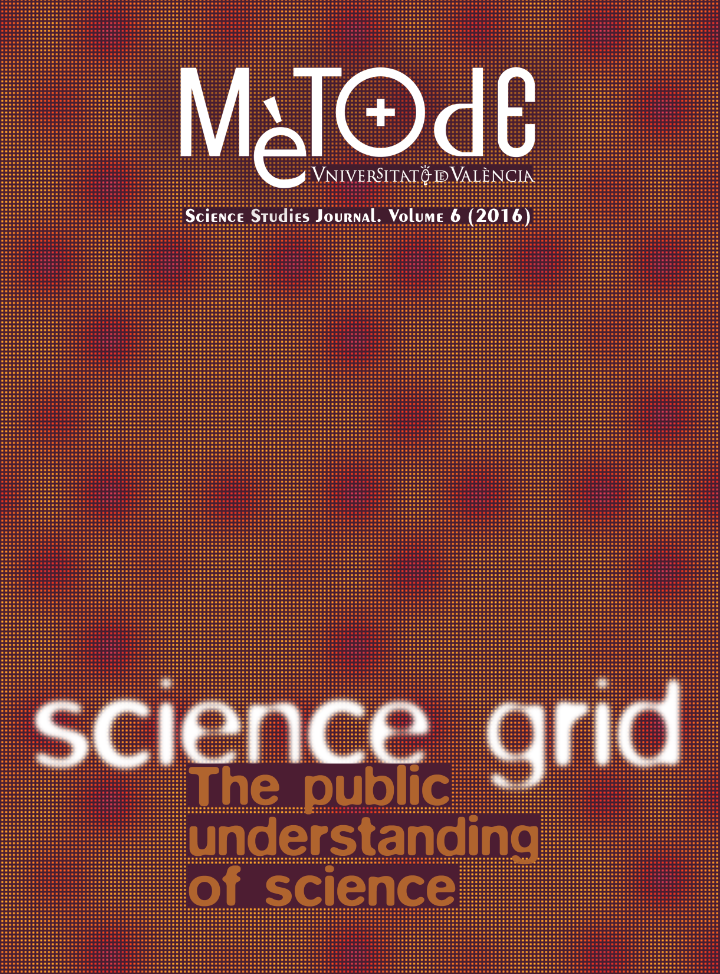How to learn from our mistakes: Communication of health crises
DOI:
https://doi.org/10.7203/metode.6.7509Keywords:
health crises, communication of risk, mad cow disease, influenza A, Ebola Abstract
Abstract
Reviewing public communications emitted during health crises in the last thirty years is useful for verifying that there are a number of repeated mistakes: for example, untrained spokespeople with poor communication skills, ambiguous messages, lack of communication plans for the crisis, and improvisation, which ends up with the transmission of alarming messages to the population and contributes to administrations being considered suspicious or untrustworthy by the people. The denatured rapeseed oil scandal, mad cow disease, influenza A virus, or the recent Ebola outbreak are clear examples of how not to communicate and offer us an opportunity to learn valuable lessons before future crises arise.
 Downloads
Downloads
 References
References
Abc. (2014, 1 October). Martínez Olmos: «La OMS tiene que rendir cuentas de la gestión de la gripe A». Abc. Retrieved from http://www.abc.es/sociedad/20141001/abci-martinez-olmos-tiene-rendir-201409302148.html
Alsina, C. (2014, 14 October). Historia de este brote de ébola. Onda Cero: El monólogo de Alsina [Audio Podcast]. Retrieved from http://blogs.ondacero.es/alsina/historia-este-brote-ebola_2014101300315.html
Ambrojo, J. C. (2010, 13 de February. ¿Qué pasó con la gripe A? El País. Retrieved from http://sociedad.elpais.com/sociedad/2010/02/13/actualidad/ 1266015601_850215.html
Asociación Nacional de Informadores de la Salud (2014a, 8 October). Comunicado de ANIS con motivo de la crisis del ébola en España. Retrieved from http://www.anisalud.com/es/actualidad/noticias-anis/comunicado-de-anis-con-motivo-de-la-crisis-del-ebola-en-espana
Asociación Nacional de Informadores de la Salud. (2014b, 13 October). Comunicado de ANIS con motivo de la crisis del ébola en España. Retrieved from http://www.anisalud.com/es/actualidad/noticias-anis/comunicado-de-anis
Asociación Nacional de Informadores de la Salud. (2015, 10-12 April). XI Congreso ANIS – Debate sobre la gestión de la crisis del Ébola [video]. Oviedo. Retrieved from https://www.youtube.com/watch?v=sJ_XUfDJmnQ
Caylá, J. A. (2009). Epidemias mediáticas, una reflexión para la salud pública. Gaceta Sanitaria, 23(5), 362–364. doi: 10.1016/j.gaceta.2009.09.002
Efe. (2010, 10 August). La OMS anuncia el fin de la pandemia de la gripe A. Efe. Retrieved from http://web.archive.org/web/20100815092520/http://www.google.com/hostednews/epa/article/ALeqM5gru2hHaWKFOq5W3vj3-QyaU-Zl8g
El médico interactivo. (2003, 10 January). Historia y evolución del síndrome del aceite tóxico (S.A.T.). El médico interactivo. Retrieved from http://www.elmedicointeractivo.com/ap1/emiold/biblio/rbcn45.htm
El Mundo. (2001, 9 January). Las frases de Celia Villalobos. El Mundo. Retrieved from http://www.elmundo.es/elmundo/2001/01/09/sociedad/979044100.html
El País. (1981, 22 May). Se desconoce aún el origen de la epidemia de neumonía atípica. El País. Retrieved from http://elpais.com/hemeroteca/elpais/portadas/1981/05/22
El País. (1987, 13 March). La ensalada de las monjas. El País. Retrieved from http://elpais.com/diario/1987/03/13/espana/542588407_850215.html
González, S. (2014, 10 October). Un país algo raro. El Mundo.
Hernández, E. (2014, 10 October). Cinco razones para publicar la fotografía de Teresa Romero. El Periódico de Cataluña. Retrieved from http://www.elperiodico.com/es/noticias/opinion/cinco-razones-para-publicar-fotografia-teresa-romero-contagiada-ebola-hospital-carlos-madrid-3590271
Martínez Olmos, J. (2014). ¿Qué pasó con la gripe A? Retrieved from http://www.quepasoconlagripea.com
Meikle, J. (2012, 25 April). Mad cow disease – a very British response to an international crisis. The Guardian. Retrieved from http://www.theguardian.com/uk/2012/apr/25/mad-cow-disease-british-crisis
Rodríguez Andrés, R. (2011). La efectividad del uso del miedo como factor persuasivo en la comunicación de riesgos en las crisis sanitarias. Revista de Comunicación y Salud, 1(2), 33–46.
Salas, J. (2014, 8 October). Los charlatanes del ébola. El País. Retrieved from http://elpais.com/elpais/2014/10/08/ciencia/1412761885_930208.html
Sampedro, J. (2001, 9 January). Villalobos desaconseja el consumo de caldo de vaca. El País. Retrieved from http://elpais.com/diario/2001/01/09/sociedad/978994806_850215.html
University of Edinburgh. (2012). Variant Creutzfeldt-Jakob disease current data (July 2012). Retrieved from https://web.archive.org/web/20120721234746/http://www.cjd.ed.ac.uk/vcjdworld.htm
World Health Organization. (2009). El nivel de alerta de pandemia de gripe se eleva de la fase 5 a la fase 6. Retrieved from http://www.who.int/mediacentre/news/statements/2009/h1n1_pandemic_phase6_20090611/es
Yoldi, J. (2014). Peor habría sido tener que trabajar. Madrid: Libros.com
Downloads
Published
How to Cite
-
Abstract3909
-
PDF461
Issue
Section
License
![]()
All the documents in the OJS platform are open access and property of their respective authors.
Authors publishing in the journal agree to the following terms:
- Authors keep the rights and guarantee Metode Science Studies Journal the right to be the first publication of the document, licensed under a Creative Commons Attribution-NonCommercial-NoDerivatives 4.0 International License that allows others to share the work with an acknowledgement of authorship and publication in the journal.
- Authors are allowed and encouraged to spread their work through electronic means using personal or institutional websites (institutional open archives, personal websites or professional and academic networks profiles) once the text has been published.






